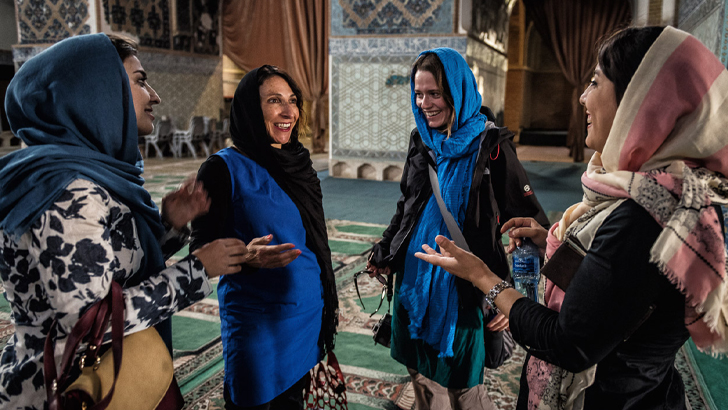TRENDING
Countries That Don’t Like Americans
Published
5 years agoon
The United States may be one of the most free and powerful countries in the world, but that doesn’t make it immune from criticism abroad, even amongst allies. Foreign diplomacy can be a difficult task, and though a lot of the world looks to the U.S. for leadership, sometimes it ruffles feathers.
 Historical indifferences, conflicting international involvements, and the harsh realities have all shaped the international view of the USA differently. Unfortunately, some of these countries are less favorable to US citizens than others. Based on polls conducted by Pew Research Center and others, these are the countries that dislike Americans the most.
Historical indifferences, conflicting international involvements, and the harsh realities have all shaped the international view of the USA differently. Unfortunately, some of these countries are less favorable to US citizens than others. Based on polls conducted by Pew Research Center and others, these are the countries that dislike Americans the most.
 As a Scandinavian country, Sweden has a pretty justifiable gripe with the way they’re perceived by Americans. Essentially, they think we see Sweden as a socialist, liberal paradise that’s actually pulling a rouse on their citizens and costing them too much. But most swedes are pretty proud of their culture and lifestyle.
As a Scandinavian country, Sweden has a pretty justifiable gripe with the way they’re perceived by Americans. Essentially, they think we see Sweden as a socialist, liberal paradise that’s actually pulling a rouse on their citizens and costing them too much. But most swedes are pretty proud of their culture and lifestyle.
 Turkey has a lot going on for such an undermined country in a contentious part of the world. Over the past decade, they’ve taken on more refugees than almost anyone, fleeing from both the middle east as well as Africa. With little U.S. assistance amidst this crisis, it fully explains their frustrations.
Turkey has a lot going on for such an undermined country in a contentious part of the world. Over the past decade, they’ve taken on more refugees than almost anyone, fleeing from both the middle east as well as Africa. With little U.S. assistance amidst this crisis, it fully explains their frustrations.
 Since the Egyptian uprising of 2011, these two have not gotten along whatsoever. Considering the Egyptians directly accuse the U.S. of sending them into disarray after supporting the overthrow of their president and letting extremists run vampant, it’s no surprise they don’t trust the American involvement.
Since the Egyptian uprising of 2011, these two have not gotten along whatsoever. Considering the Egyptians directly accuse the U.S. of sending them into disarray after supporting the overthrow of their president and letting extremists run vampant, it’s no surprise they don’t trust the American involvement.
 Argentinians have a pretty valid, yet comical reason to feel swiped by “Americans,” because being from South America themselves, they too, are “Americans.” It’s understandable that many countries on the neighboring continent probably feel this way, but the Argentines also feel that the U.S. has stolen many of their traditional cooking practices as well.
Argentinians have a pretty valid, yet comical reason to feel swiped by “Americans,” because being from South America themselves, they too, are “Americans.” It’s understandable that many countries on the neighboring continent probably feel this way, but the Argentines also feel that the U.S. has stolen many of their traditional cooking practices as well.
 While Jordan is easily one of the most strong and important middle eastern allies the U.S. has in the region, it’s not a surprise that the citizens are fatigued by all the American involvement in the area. While they’re generally favorable of the American people, they’re skeptical of the long term effects of recent conflict surrounding them.
While Jordan is easily one of the most strong and important middle eastern allies the U.S. has in the region, it’s not a surprise that the citizens are fatigued by all the American involvement in the area. While they’re generally favorable of the American people, they’re skeptical of the long term effects of recent conflict surrounding them.
 The Mexican/American rivalry can be traced back to the early wars of the 1800s, but in modern context, most of the disagreements between the two have to do with any and everything regarding the border. While administrations change, it continues to be a hot button issue.
The Mexican/American rivalry can be traced back to the early wars of the 1800s, but in modern context, most of the disagreements between the two have to do with any and everything regarding the border. While administrations change, it continues to be a hot button issue.
 Trade disputes have undeniably become a contested issue between these two, and the economic faceoff they continue to have is something the whole world is intently watching. However, the United States’ criticism and continued sanctions keep the relationship rocky, but both know they must coexist.
Trade disputes have undeniably become a contested issue between these two, and the economic faceoff they continue to have is something the whole world is intently watching. However, the United States’ criticism and continued sanctions keep the relationship rocky, but both know they must coexist.
 The animosity between the U.S. and Russia is no secret, and the relationship has continued to be volatile since the end of the Cold War. Between continued allegations of spying, meddling and manipulation in American affairs from Russia, and them being labeled as an adversary by the U.S., it’s hard to believe the two countries are seeing eye-to-eye anytime soon.
The animosity between the U.S. and Russia is no secret, and the relationship has continued to be volatile since the end of the Cold War. Between continued allegations of spying, meddling and manipulation in American affairs from Russia, and them being labeled as an adversary by the U.S., it’s hard to believe the two countries are seeing eye-to-eye anytime soon.
 Australia has a large and diverse native population, and when seeing some of the sociological concerns that have become highly polarized over the recent years, they’re skeptical mostly of leadership in relation to these events. However, the countries’ citizens generally get along.
Australia has a large and diverse native population, and when seeing some of the sociological concerns that have become highly polarized over the recent years, they’re skeptical mostly of leadership in relation to these events. However, the countries’ citizens generally get along.
 The Spanish have mostly taken offense to the U.S. opposition to many things in the European Union. Think previous withdrawals from key global humanitarian and environmental coalitions. Since they rely heavily on America’s influence, they want more stability from an international sense.
The Spanish have mostly taken offense to the U.S. opposition to many things in the European Union. Think previous withdrawals from key global humanitarian and environmental coalitions. Since they rely heavily on America’s influence, they want more stability from an international sense.
 The Dutch have been continuously critical of the U.S. in recent years, but it stems back to American involvement in east Asia half a century ago. However, today they view Americans to be more egocentric, intolerant, and unhealthy more than anything else. This perception tends to be rooted in the tourists who visit Amsterdam.
The Dutch have been continuously critical of the U.S. in recent years, but it stems back to American involvement in east Asia half a century ago. However, today they view Americans to be more egocentric, intolerant, and unhealthy more than anything else. This perception tends to be rooted in the tourists who visit Amsterdam.
 The French have long had a feeling of being superior to Americans, but as history has shown us, the two have had off-and-on relations over the centuries. In a period where the U.S. is mending many European relationships, and the world is combatting more dangerous ideologies, the contentious past actually has the opportunity for renewed unity.
The French have long had a feeling of being superior to Americans, but as history has shown us, the two have had off-and-on relations over the centuries. In a period where the U.S. is mending many European relationships, and the world is combatting more dangerous ideologies, the contentious past actually has the opportunity for renewed unity.
 If you watch the news, you know Iran isn’t our friend, and that’s been the case since the U.S. embassy raid in Tehran in 1979. But between the U.S. stifling their nuclear arsenal, and their criticisms of American unrest and painting our society as“unruly”, it seems the two countries are trying to point the finger at each other, which translates to the people.
If you watch the news, you know Iran isn’t our friend, and that’s been the case since the U.S. embassy raid in Tehran in 1979. But between the U.S. stifling their nuclear arsenal, and their criticisms of American unrest and painting our society as“unruly”, it seems the two countries are trying to point the finger at each other, which translates to the people.
 Lebanon has often become a country caught in the crossfire, and being located in one of the most hostile places on Earth, it’s hard to blame them for being conflicted. However, their frustrations with the U.S. come from the harsh blockages we’ve put on humanitarian aid, paired with the continued instability they face from their neighbors.
Lebanon has often become a country caught in the crossfire, and being located in one of the most hostile places on Earth, it’s hard to blame them for being conflicted. However, their frustrations with the U.S. come from the harsh blockages we’ve put on humanitarian aid, paired with the continued instability they face from their neighbors.
 Germany functions much like the U.S., from diversity to democratic government practices, but they’ve become highly critical of the American lifestyle, and particularly that it’s better than other democracies. In actuality, Germans love many American things, but are hesitant to attach themselves to potentially problematic parts of our culture.
Germany functions much like the U.S., from diversity to democratic government practices, but they’ve become highly critical of the American lifestyle, and particularly that it’s better than other democracies. In actuality, Germans love many American things, but are hesitant to attach themselves to potentially problematic parts of our culture.
 Tunisia hasn’t necessarily been known to be an adversary of the U.S. by any means, but a particular viral hateful video by an American caused a big stir in the nation. However, there’s a fruitful opportunity to restore that relationship going forward.
Tunisia hasn’t necessarily been known to be an adversary of the U.S. by any means, but a particular viral hateful video by an American caused a big stir in the nation. However, there’s a fruitful opportunity to restore that relationship going forward.
 Despite Greece’s large presence in the U.S., the actual Greeks who still live in the Mediterranean are mostly fed up with American tourists coming over and drinking too much. Also, the debt-ridden country has a particular frustration with the concept of the American dream.
Despite Greece’s large presence in the U.S., the actual Greeks who still live in the Mediterranean are mostly fed up with American tourists coming over and drinking too much. Also, the debt-ridden country has a particular frustration with the concept of the American dream.
 This one is kind of inevitable. After the numerous years of conflict and hostility throughout the country, Iraq is more or less saying “we’ll just do it ourselves.” What started out as trying to help quickly deteriorated into much worse, so it’s hard to blame the civilians themselves for feeling this way.
This one is kind of inevitable. After the numerous years of conflict and hostility throughout the country, Iraq is more or less saying “we’ll just do it ourselves.” What started out as trying to help quickly deteriorated into much worse, so it’s hard to blame the civilians themselves for feeling this way.
 Pakistan’s involvement in aiding and abetting middle east controversies has put them on notice by U.S. government officials, and this has resulted in extended military presence in their country, which they are not pleased with. Coupled with invading their matters and being critical of their leadership, it’s not surprising they’re not fans.
Pakistan’s involvement in aiding and abetting middle east controversies has put them on notice by U.S. government officials, and this has resulted in extended military presence in their country, which they are not pleased with. Coupled with invading their matters and being critical of their leadership, it’s not surprising they’re not fans.
 Slovenia’s distaste for American culture is mostly rooted in their historic ties to the then Soviet Union, which led them to believe that western democracies were an impending threat to their livelihood. However, differing economic interests and priorities also serve as separation.
Slovenia’s distaste for American culture is mostly rooted in their historic ties to the then Soviet Union, which led them to believe that western democracies were an impending threat to their livelihood. However, differing economic interests and priorities also serve as separation.
 Ironically, the distaste Australians have for the U.S. isn’t even rooted in anything cynical, but more so eastern vs. western cuisine. The land down under is known for their adventurous food traditions, while they basically scoff at the commercialization of fast food and eating habits in America.
Ironically, the distaste Australians have for the U.S. isn’t even rooted in anything cynical, but more so eastern vs. western cuisine. The land down under is known for their adventurous food traditions, while they basically scoff at the commercialization of fast food and eating habits in America.
 As an eastern European country that is not part of the E.U., it’s easy to notice that their close friendedness with Russia points to their general dislike of the United States. However, their own economic woes resonate with an uneasy trend that shows countries with low economic morale not favoring the U.S.
As an eastern European country that is not part of the E.U., it’s easy to notice that their close friendedness with Russia points to their general dislike of the United States. However, their own economic woes resonate with an uneasy trend that shows countries with low economic morale not favoring the U.S.
 Palestinians view the United States’ involvement with Israel and the consequences of those affairs and those effects on its people to be a great injustice. Nothing about this bitter rivalry is new, but renewed tensions in the region have led to growing resentment, which is unfortunately inevitable.
Palestinians view the United States’ involvement with Israel and the consequences of those affairs and those effects on its people to be a great injustice. Nothing about this bitter rivalry is new, but renewed tensions in the region have led to growing resentment, which is unfortunately inevitable.
 Chile may be considered one of the United States’ most trusted Latin American allies, but its citizens aren’t too fond of Americans. They’re particularly critical of the way rhetoric regarding Latinos has gotten dismissive, and honestly feel they’ve gotten abandoned in many trade talks.
Chile may be considered one of the United States’ most trusted Latin American allies, but its citizens aren’t too fond of Americans. They’re particularly critical of the way rhetoric regarding Latinos has gotten dismissive, and honestly feel they’ve gotten abandoned in many trade talks.
 Our neighbors to the north actually have a faulty perception of animosity towards the U.S., as it’s usually common practice by politicians to rag on their neighbors for political fuel. However, they also carry a gripe with Americans’ constant criticism of their healthcare system.
Our neighbors to the north actually have a faulty perception of animosity towards the U.S., as it’s usually common practice by politicians to rag on their neighbors for political fuel. However, they also carry a gripe with Americans’ constant criticism of their healthcare system.
 Though Belgium and the U.S. have maintained decent relations since the world wars, its heavily diverse European and African population lead there to be an eventual divide between cultural and social habits, with many seeing Americans as gluttonous or unkind. Many also ironically feel slighted at Americans’ inability to find it on a map.
Though Belgium and the U.S. have maintained decent relations since the world wars, its heavily diverse European and African population lead there to be an eventual divide between cultural and social habits, with many seeing Americans as gluttonous or unkind. Many also ironically feel slighted at Americans’ inability to find it on a map.
 The United Kingdom and United States began as adversaries, so it’s not necessarily surprising that some resentment has carried over despite a few centuries passing. Generally the distaste from their point of view is old school, and looks down on the frivolous lifestyle and unorganized governing they see as led astray from their traditional history.
The United Kingdom and United States began as adversaries, so it’s not necessarily surprising that some resentment has carried over despite a few centuries passing. Generally the distaste from their point of view is old school, and looks down on the frivolous lifestyle and unorganized governing they see as led astray from their traditional history.
 Singapore is known for its high standards, so it isn’t too surprising that they would increasingly judge the western world for its lifestyle choices. Sanitation and overall health is perceived as very poor from their point of view, and as a country priding itself on perfection and cleanliness, they also see western democracy as a literal wild west with more disorder than progress.
Singapore is known for its high standards, so it isn’t too surprising that they would increasingly judge the western world for its lifestyle choices. Sanitation and overall health is perceived as very poor from their point of view, and as a country priding itself on perfection and cleanliness, they also see western democracy as a literal wild west with more disorder than progress.
 The Japanese are generally favorable of the United States, and that’s thanks to a lot of cultural crossover, from music to movies and other various forms of art. However, there’s always the traditionalists in any culture who are continuously wary of the self-perceived image of the U.S. and its citizens, which they find to be more pompous than their own people.
The Japanese are generally favorable of the United States, and that’s thanks to a lot of cultural crossover, from music to movies and other various forms of art. However, there’s always the traditionalists in any culture who are continuously wary of the self-perceived image of the U.S. and its citizens, which they find to be more pompous than their own people.
 Despite a ton of Italians having emigrated to the United States over the years, many native Italians are still not very fond of Americans. And that has a lot to do with the “Americanization” of Italian culture in the States, which spans anything from their food to style, and namely how their portrayed in popular culture.
Despite a ton of Italians having emigrated to the United States over the years, many native Italians are still not very fond of Americans. And that has a lot to do with the “Americanization” of Italian culture in the States, which spans anything from their food to style, and namely how their portrayed in popular culture.
 You wouldn’t necessarily assume that Malaysia isn’t fond of Americans, but you can understand the figure is likely higher because of their limited relationship and knowledge of the western world in general. For them, they’re likely enthusiastic due to entertainment’s reach, but like many other Asian countries, some of them certainly know the way the U.S. has treated the region in the past.
You wouldn’t necessarily assume that Malaysia isn’t fond of Americans, but you can understand the figure is likely higher because of their limited relationship and knowledge of the western world in general. For them, they’re likely enthusiastic due to entertainment’s reach, but like many other Asian countries, some of them certainly know the way the U.S. has treated the region in the past.
 It’s no question Iran is one of the United States’ biggest adversaries, and because of their government’s staunch opposition to the U.S. almost outright, it’s not surprising many of their people follow suit. Though there are certainly Iranians who have a positive viewpoint, it’s tough to understand when it’s a very closed-off country in comparison to most others.
It’s no question Iran is one of the United States’ biggest adversaries, and because of their government’s staunch opposition to the U.S. almost outright, it’s not surprising many of their people follow suit. Though there are certainly Iranians who have a positive viewpoint, it’s tough to understand when it’s a very closed-off country in comparison to most others.
 North Korea is arguably the worst dictatorship in the world, and most people know by now that its citizens have unrelenting pride for no one else but their own country and leader, Kim Jong Un. However, if it’s pure ignorance and being closed off from the rest of the world that brings this number to its incomprehensibly high figure, it’s not really the fault of the citizens who are taught everyone is opposition.
North Korea is arguably the worst dictatorship in the world, and most people know by now that its citizens have unrelenting pride for no one else but their own country and leader, Kim Jong Un. However, if it’s pure ignorance and being closed off from the rest of the world that brings this number to its incomprehensibly high figure, it’s not really the fault of the citizens who are taught everyone is opposition.
 Brazil is South America’s most populous and diverse nation, and in many ways, they try to act as the United States’ counterpart to the south. But with giant populations come differing views, and inevitably, the same latino stereotypes that Mexicans dislike apply here, and many Brazilians see the U.S. as a culture vulture. However, many Brazilians love Americans, even when they’re tourists.
Brazil is South America’s most populous and diverse nation, and in many ways, they try to act as the United States’ counterpart to the south. But with giant populations come differing views, and inevitably, the same latino stereotypes that Mexicans dislike apply here, and many Brazilians see the U.S. as a culture vulture. However, many Brazilians love Americans, even when they’re tourists.
 India is another country whose sheer population leads to different sects of the population not condoning the lifestyle and behavior of many Americans, but this is also due to a serious difference in cultural practices. India has numerous populations of differing religious groups, wealth, and even languages coexisting at once, but western values are literally a foreign concept to many still.
India is another country whose sheer population leads to different sects of the population not condoning the lifestyle and behavior of many Americans, but this is also due to a serious difference in cultural practices. India has numerous populations of differing religious groups, wealth, and even languages coexisting at once, but western values are literally a foreign concept to many still.

ADVERTISEMENT - CONTINUE BELOW
Sweden – 34% Unfavorable

ADVERTISEMENT - CONTINUE BELOW
Turkey – 73% Unfavorable

ADVERTISEMENT - CONTINUE BELOW
Egypt – 85% Unfavorable

ADVERTISEMENT - CONTINUE BELOW
Argentina – 57% Unfavorable

ADVERTISEMENT - CONTINUE BELOW
Jordan – 85% Unfavorable

ADVERTISEMENT - CONTINUE BELOW
Mexico – 65% Unfavorable

ADVERTISEMENT - CONTINUE BELOW
China – 54% Unfavorable

ADVERTISEMENT - CONTINUE BELOW
Russia – 71% Unfavorable

ADVERTISEMENT - CONTINUE BELOW
Australia –46% Unfavorable

ADVERTISEMENT - CONTINUE BELOW
Spain – 40% Unfavorable

ADVERTISEMENT - CONTINUE BELOW
Netherlands – 40% Unfavorable

ADVERTISEMENT - CONTINUE BELOW
France – 43% Unfavorable

ADVERTISEMENT - CONTINUE BELOW
Iran – 61% Unfavorable

ADVERTISEMENT - CONTINUE BELOW
Lebanon – 57% Unfavorable

ADVERTISEMENT - CONTINUE BELOW
Germany – 37% Unfavorable

ADVERTISEMENT - CONTINUE BELOW
Tunisia – 47% Unfavorable

ADVERTISEMENT - CONTINUE BELOW
Greece – 52% Unfavorable

ADVERTISEMENT - CONTINUE BELOW
Iraq – 67% Unfavorable

ADVERTISEMENT - CONTINUE BELOW
Pakistan – 62% Unfavorable

ADVERTISEMENT - CONTINUE BELOW
Slovenia – 54% Unfavorable

ADVERTISEMENT - CONTINUE BELOW
Austria – 55% Unfavorable

ADVERTISEMENT - CONTINUE BELOW
Belarus – 69% Unfavorable

ADVERTISEMENT - CONTINUE BELOW
Palestine – 80% Unfavorable

ADVERTISEMENT - CONTINUE BELOW
Chile – 47% Unfavorable

ADVERTISEMENT - CONTINUE BELOW
Canada – 37% Unfavorable

ADVERTISEMENT - CONTINUE BELOW
Belgium – 44% Unfavorable

ADVERTISEMENT - CONTINUE BELOW
United Kingdom – 36% Unfavorability

ADVERTISEMENT - CONTINUE BELOW
Singapore – 49% Unfavorability

ADVERTISEMENT - CONTINUE BELOW
Japan – 30% Unfavorability

ADVERTISEMENT - CONTINUE BELOW
Italy – 39% Unfavorability

ADVERTISEMENT - CONTINUE BELOW
Malaysia – 56% Unfavorability

ADVERTISEMENT - CONTINUE BELOW
Iran – 79% Unfavorability

ADVERTISEMENT - CONTINUE BELOW
North Korea –98% Unfavorability

ADVERTISEMENT - CONTINUE BELOW
Brazil – 42% Unfavorability

ADVERTISEMENT - CONTINUE BELOW
India – 37% Unfavorability

ADVERTISEMENT - CONTINUE BELOW
ADVERTISEMENT - CONTINUE BELOW
About Money+Investing
Money + Investing provides our community with the latest personal and business finance news from around the world. We publish money saving and earning tips to help you make smartier investing decisions. We're inspired by exploring and providing new ways for our audience to achieve financial freedom. We can't wait to share all of our exciting deals, guides and reviews to help you live your financial life to the fullest.
More Money + Investing
-


The Greatest Bands of All Time – Ranked
-


Strict Protocols The FBI Follows
-


Worst Costume Errors In Movie History
-


Most Bizarre Guinness World Record Holders
-


Money-Saving Hacks To Increase Your Wealth
-


The Largest Athletes In Sports History
-


Most Dominating NFL Players Of All Time
-


Incredibly Lavish Celebrity Homes
-


30 Greatest QBs of All Time – Ranked
-


Celebrity Couple Height Differences
-


The Greatest NBA Players Of All Time – Ranked
-


Celebs Living With Chronic Conditions
